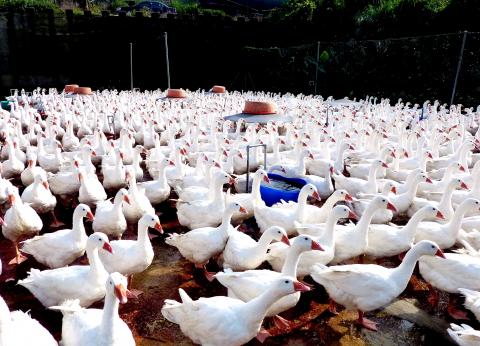A 53-year-old Taiwanese man who had worked in China’s Jiangsu Province has tested positive for the H7N9 avian flu virus, the Central Epidemic Command Center said yesterday.
The man, who is now in serious condition, is receiving treatment, including intubation, in a negative-pressure quarantine ward, the center said.
It marked the first confirmed human infection of the new bird flu strain in Taiwan and also the first confirmed H7N9 case outside of China, the center said.

Photo: David Chang, EPA
The infection source of the first imported H7N9 case remained unknown, because he neither came into contact with poultry or other birds during his stay in Jiangsu, nor had he eaten raw or undercooked eggs or poultry while there, the center said.
The patient fell ill three days after his return from China, the center said.
According to the center, 139 people are known to have come into contact with him. Three of them had close contact, 26 had contact more than seven days ago (putting them past the infectious period) and 110 are hospital personnel, it said.
Three of the hospital personnel, who had taken proper protective measures when providing medical care for the patient, have developed respiratory symptoms, the center said.
The center added that all those who have had contact with the patient have been notified and told to take care of their health.
They will be subject to close monitoring until the infectious period expires, the center said, adding that public health officials will help people on the watch list get medical treatment should they develop flu-like symptoms, such as fever or coughing.
According to the center, the patient is a hepatitis B carrier and also suffers from hypertension, adding that his H7N9 infection was confirmed yesterday.
The center said it had informed the WHO and China of the case earlier in the day.
China reported the world’s first confirmed human infections of H7N9 on March 31, and as of Tuesday, 108 cases had been confirmed in China, with 22 deaths.
The CDC said there is still no evidence that the H7N9 virus has mutated into a form that will allow sustained person-to-person transmissions.
Later yesterday evening, the Taipei City Government launched its emergency response mechanism to provide information to the public. It also opened an avian flu hotline on (02) 2375-3782 to answer questions from those who have concerns about the flu.
Taipei City’ Department of Health Chief Secretary Chiang Yu-mei (姜郁美) said that people with questions can also call the 1999 Citizen Hotline and that department members would assist the hotline staff with inquiries about the flu, and seek to reduce public panic over the first case of H7N9.
Head of the department Lin Chi-hung (林奇宏) yesterday declined to confirm whether the first H7N9 case was in Taipei, but said the department will inspect the facilities of the city’s designated avian flu response hospital, Taipei Hoping Hospital, and another 16 hospitals that are equipped with quarantine rooms to prevent a potential outbreak.

A magnitude 7.0 earthquake struck off Yilan at 11:05pm yesterday, the Central Weather Administration (CWA) said. The epicenter was located at sea, about 32.3km east of Yilan County Hall, at a depth of 72.8km, CWA data showed There were no immediate reports of damage. The intensity of the quake, which gauges the actual effect of a seismic event, measured 4 in Yilan County area on Taiwan’s seven-tier intensity scale, the data showed. It measured 4 in other parts of eastern, northern and central Taiwan as well as Tainan, and 3 in Kaohsiung and Pingtung County, and 2 in Lienchiang and Penghu counties and 1

FOREIGN INTERFERENCE: Beijing would likely intensify public opinion warfare in next year’s local elections to prevent Lai from getting re-elected, the ‘Yomiuri Shimbun’ said Internal documents from a Chinese artificial intelligence (AI) company indicated that China has been using the technology to intervene in foreign elections, including propaganda targeting Taiwan’s local elections next year and presidential elections in 2028, a Japanese newspaper reported yesterday. The Institute of National Security of Vanderbilt University obtained nearly 400 pages of documents from GoLaxy, a company with ties to the Chinese government, and found evidence that it had apparently deployed sophisticated, AI-driven propaganda campaigns in Hong Kong and Taiwan to shape public opinion, the Yomiuri Shimbun reported. GoLaxy provides insights, situation analysis and public opinion-shaping technology by conducting network surveillance

‘POLITICAL GAME’: DPP lawmakers said the motion would not meet the legislative threshold needed, and accused the KMT and the TPP of trivializing the Constitution The Legislative Yuan yesterday approved a motion to initiate impeachment proceedings against President William Lai (賴清德), saying he had undermined Taiwan’s constitutional order and democracy. The motion was approved 61-50 by lawmakers from the main opposition Chinese Nationalist Party (KMT) and the smaller Taiwan People’s Party (TPP), who together hold a legislative majority. Under the motion, a roll call vote for impeachment would be held on May 19 next year, after various hearings are held and Lai is given the chance to defend himself. The move came after Lai on Monday last week did not promulgate an amendment passed by the legislature that

AFTERMATH: The Taipei City Government said it received 39 minor incident reports including gas leaks, water leaks and outages, and a damaged traffic signal A magnitude 7.0 earthquake struck off Taiwan’s northeastern coast late on Saturday, producing only two major aftershocks as of yesterday noon, the Central Weather Administration (CWA) said. The limited aftershocks contrast with last year’s major earthquake in Hualien County, as Saturday’s earthquake occurred at a greater depth in a subduction zone. Saturday’s earthquake struck at 11:05pm, with its hypocenter about 32.3km east of Yilan County Hall, at a depth of 72.8km. Shaking was felt in 17 administrative regions north of Tainan and in eastern Taiwan, reaching intensity level 4 on Taiwan’s seven-tier seismic scale, the CWA said. In Hualien, the